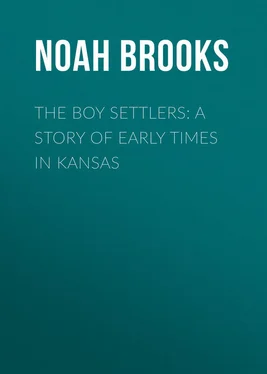Noah Brooks - The Boy Settlers - A Story of Early Times in Kansas
Здесь есть возможность читать онлайн «Noah Brooks - The Boy Settlers - A Story of Early Times in Kansas» — ознакомительный отрывок электронной книги совершенно бесплатно, а после прочтения отрывка купить полную версию. В некоторых случаях можно слушать аудио, скачать через торрент в формате fb2 и присутствует краткое содержание. Жанр: foreign_antique, foreign_prose, foreign_children, на английском языке. Описание произведения, (предисловие) а так же отзывы посетителей доступны на портале библиотеки ЛибКат.
- Название:The Boy Settlers: A Story of Early Times in Kansas
- Автор:
- Жанр:
- Год:неизвестен
- ISBN:нет данных
- Рейтинг книги:5 / 5. Голосов: 1
-
Избранное:Добавить в избранное
- Отзывы:
-
Ваша оценка:
- 100
- 1
- 2
- 3
- 4
- 5
The Boy Settlers: A Story of Early Times in Kansas: краткое содержание, описание и аннотация
Предлагаем к чтению аннотацию, описание, краткое содержание или предисловие (зависит от того, что написал сам автор книги «The Boy Settlers: A Story of Early Times in Kansas»). Если вы не нашли необходимую информацию о книге — напишите в комментариях, мы постараемся отыскать её.
The Boy Settlers: A Story of Early Times in Kansas — читать онлайн ознакомительный отрывок
Ниже представлен текст книги, разбитый по страницам. Система сохранения места последней прочитанной страницы, позволяет с удобством читать онлайн бесплатно книгу «The Boy Settlers: A Story of Early Times in Kansas», без необходимости каждый раз заново искать на чём Вы остановились. Поставьте закладку, и сможете в любой момент перейти на страницу, на которой закончили чтение.
Интервал:
Закладка:
It was a quiet party that drove over the prairie that bright and beautiful morning. The two boys in the buggy spoke occasionally in far-off-sounding voices about indifferent things that attracted their attention as they drove along. Mr. Howell held the reins, with a certain stern sense of duty on his dark and handsome face. Sandy sat silently by his side, the big tears coursing down his freckled cheeks.
CHAPTER III.
ON THE DISPUTED TERRITORY
The straggling, unkempt, and forlorn town of Parkville, Missouri, was crowded with strangers when the emigrants arrived there after a long and toilsome drive through Iowa. They had crossed the Mississippi from Illinois into Iowa, at Fulton, on the eastern shore, and after stopping to rest for a day or two in Clinton, a pretty village on the opposite bank, had pushed on, their faces ever set westward. Then, turning in a southwesterly direction, they travelled across the lower part of the State, and almost before they knew it they were on the sacred soil of Missouri, the dangers of entering which had been pictured to them all along the route. They had been warned by the friendly settlers in Iowa to avoid St. Joseph, one of the crossings from Missouri into Kansas; it was a nest of Border Ruffians, so they were told, and they would surely have trouble. They must also steer clear of Leavenworth; for that town was the headquarters of a number of Missourians whose names were already terrible all over the Northern States, from Kansas to Massachusetts Bay.
“But there is the military at Fort Leavenworth,” replied Mr. Bryant. “Surely they will protect the citizens of the United States who are peaceful and well-behaved. We are only peaceable immigrants.”
“Pshaw!” answered an Iowa man. “All the army officers in this part of the country are pro-slavery men. They are in sympathy with the pro-slavery men, anyhow, and if they had been sent here to keep free-State men out of the Territory, they couldn’t do any different from what they are doing. It’s an infernal shame, that’s what it is.”
Bryant said nothing in reply, but as they trudged along, for the roads were very bad, and they could not often ride in their vehicles now, his face grew dark and red by turns. Finally he broke out,–
“See here, Aleck,” he cried, “I don’t want to sneak into the Territory. If these people think they can scare law-abiding and peaceable citizens of a free country from going upon the land of these United States, we might just as well fight first as last. For one, I will not be driven out of a country that I have got just as much right to as any of these hot-headed Missouri fellows.”
His brother-in-law looked troubled, but before he could speak the impetuous and fiery Sandy said: “That’s the talk, Uncle Charlie! Let’s go in by the shortest way, and tackle the Border Ruffians if they tackle us. Who’s afraid?” And the lad bravely handled his “pepper-box,” as his old-fashioned five-barrelled revolver was sportively called by the men of those days; for the modern revolver with one barrel for all the chambers of the weapon had not then come into use. “Who’s afraid?” he repeated fiercely, looking around. Everybody burst out laughing, and the valorous Sandy looked rather crestfallen.
“I am afraid, for one,” said his father. “I want no fighting, no bloodshed. I want to get into the Territory and get to work on our claim, just as soon as possible; but if we can’t get there without a fight, why then, I’ll fight. But I ain’t seeking for no fight.” When Aleck Howell was excited, his grammar went to the four winds. His view of the situation commended itself to the approval of Oscar, who said he had promised his mother that he would avoid every appearance of hostile intention, keep a civil tongue in his head, have his weapons out of sight and his powder always dry.
The emigrants decided to go into Kansas by way of Parkville.
At Claybank, half-way between the Iowa line and the Missouri River, they encountered a drover with a herd of cattle. He was eager to dicker with the Kansas emigrants, and offered them what they considered to be a very good bargain in exchanging oxen for their horses. They were now near the Territory, and the rising prices of almost everything that immigrants required warned them that they were not far from the point where an outfit could no longer be bought at any reasonable price. The boys were loth to part with their buggy; for, although they had been often compelled to go afoot through some of the worst roads in the States of Iowa and Missouri, they had clung to the notion that they might have a pair of horses to take into the Territory, and, while the buggy was left to them, they had a refuge in times of weariness with walking; and these were rather frequent. The wagon was exchanged for another, suitable for oxen.
The immigrants drove gayly into Parkville. They were in sight of the Promised Land. The Big Muddy, as Missourians affectionately call the turbid stream that gives name to their State, rolled sluggishly between the Parkville shore and the low banks fringed with cottonwoods that were the eastern boundary of Kansas. Looking across, they could see long lines of white-covered wagons, level plains dotted with tents, and the rising smoke of many fires, where people who had gone in ahead of them were cooking their suppers; for they entered Parkville late in the afternoon. It was a commonplace-looking view of Kansas, after all, and not at all like what the lads had fancied it would be. Sandy very emphatically expressed his disappointment.
“What would you have, Sandy?” asked his uncle, with some amusement. “Did you expect to see wild honey dripping out of the cottonwoods and sycamores, buffaloes and deer standing up and waiting to be shot at, and a farm ready to be tilled?”
“Well,” replied the boy, a little shamefacedly, “I didn’t exactly expect to see all those things; but somehow the country looks awful flat and dull. Don’t you think so?”
For answer, Mr. Bryant pointed out a line of blue slopes in the distance. “Those are not very high hills, my boy, to be sure, but they are on the rolling prairie beyond, and as soon as we get away from the river we shall find a bluffy and diversified country, I’ll warrant you.”
“Yes; don’t you remember,” broke in Oscar, eagerly, “Governor Robinson’s book told all about the rolling and undulating country of the Territory, and the streams that run under high bluffs in some places?”
Sandy admitted that this was true of the book; but he added, “Some books do lie, though.”
“Not Governor Robinson’s book,” commented his brother Charlie, with a slight show of resentment. For Charlie had made a study of the reports from the Promised Land.
But a more pressing matter was the attitude of the border-State men toward the free-State emigrants, and the question of making the necessary purchases for their farming scheme. Parkville was all alive with people, and there were many border-State men among them. Some of these regarded the newcomers with unmistakable hostility, noting which, Sandy and Oscar took good care to keep near their two grown-up protectors; and the two men always went about with their weapons within easy reaching distance. All of the Borderers were opposed to any more free-State men going into the Territory; and many of them were disposed to stop this by force, if necessary. At one time, the situation looked very serious, and Sandy got his “pepper-box” into position. But the trouble passed away, and the arrival of fifteen or twenty teams, accompanied by a full complement of men, checked a rising storm of wrath.
From Platte City, a short distance up the river, however, came doleful and distressing stories of the ill-treatment of the free-State men who had gone that way. They were harassed and hindered, and, in some cases, their teams were deliberately turned about and driven back on the road by which they had come. It was useless to remonstrate when the rifles of a dozen men were levelled at the would-be immigrants. But our travellers in Parkville heard a good story of the bravery of one free-State man who had been refused transportation across the ferry at Platte City, kept by an ardent pro-slavery man. The intending immigrant, unconscious of any hindrance to his crossing, was calmly driving down to the ferry-boat, a flat-bottomed craft propelled by long oars, or sweeps, when the ferryman stopped him with the question, “What hev ye got into yer waggin?”
Читать дальшеИнтервал:
Закладка:
Похожие книги на «The Boy Settlers: A Story of Early Times in Kansas»
Представляем Вашему вниманию похожие книги на «The Boy Settlers: A Story of Early Times in Kansas» списком для выбора. Мы отобрали схожую по названию и смыслу литературу в надежде предоставить читателям больше вариантов отыскать новые, интересные, ещё непрочитанные произведения.
Обсуждение, отзывы о книге «The Boy Settlers: A Story of Early Times in Kansas» и просто собственные мнения читателей. Оставьте ваши комментарии, напишите, что Вы думаете о произведении, его смысле или главных героях. Укажите что конкретно понравилось, а что нет, и почему Вы так считаете.












